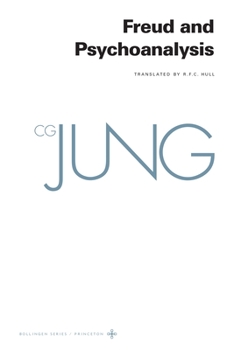Collected Works of C. G. Jung, Volume 4: Freud and Psychoanalysis
(Book #4 in the Jung's Collected Works Series)
Select Format
Select Condition 
Book Overview
The authoritative edition of Jung's essential writings for understanding his early enthusiasm for--and later split with--Freud and psychoanalysis
Format:Paperback
Language:English
ISBN:0691259399
ISBN13:9780691259390
Release Date:March 2024
Publisher:Princeton University Press
Length:392 Pages
Weight:1.26 lbs.
Dimensions:0.9" x 6.0" x 9.0"
Customer Reviews
1 rating
Differences between Jung & Freud highlight deep psychology
Published by Thriftbooks.com User , 20 years ago
This is one of the better books in Jung's Collected Works though a Freudian would probably not agree. In Jung's view, unconscious, repressed material is not necessarily factual. p. 95-6 We are thus obliged to assume that many traumata in early infancy are of a purely fantastic nature, mere fantasies in fact, while others do have objective reality. Experience shows us that fantasies can be just as traumatic in their effect as real traumata. p. 179 The earlier in childhood an impression is said to have arisen, the more suspect is its reality...the earlier a patient places some impressive experience in his childhood, the more likely it is to be a fantastic and regressive one. Of course, the obvious reason for Jung's split with Freud was over the nature of libido (psychic energy) and whether neuroses were always due to infantile sexual problems. p. 250-1 I cannot see the real aetiology of neurosis in the various manifestations of infantile sexual development and the fantasies to which they give rise. The fact that these fantasies are exaggerated in neurosis and occupy the foreground is a consequence of the stored-up energy or libido. The psychological trouble in neurosis, and the neurosis itself, can be formulated as an act of adaptation that has failed...a neurosis is, in a sense, an attempt at self-cure...Though we no longer imagine we are unearthing the ultimate root of the illness, we have to pull up the sexual fantasies because the energy which the patient needs for his health, that is, for adaptation, is attached to them. By means of psychoanalysis the connection between his conscious mind and the libido in the unconscious is re-established. Thus the unconscious libido is brought under the control of the will. Only in this way can the split-off energy become available again for the accomplishment of the necessary tasks of life...a highly moral task of immense educational value. Furthermore, our response to what happens is our responsibility. p. 177 We must never forget that the world is, in the first place, a subjective phenomenon. The impressions we receive from these accidental happenings are also our own doing. It is not true that the impressions are forced on us unconditionally; our own predisposition conditions the impression. p. 192 Nothing makes people more lonely, and more cutoff from the fellowship of others, than the possession of an anxiously hidden and jealously guarded personal secret. But there are other significant differences. For example, Jung states that Analysts must themselves undergo analysis, Freudians were not required to do this. p. 198-9 Nowhere more clearly than at this stage of the analysis will everything depend on how far the analyst has been analyzed himself. If he himself has an infantile type of desire of which he is still unconscious, he will never be able to open his patient's eyes to this danger. It is an open secret that all through the analysis intelligent patients are looking beyond it into





